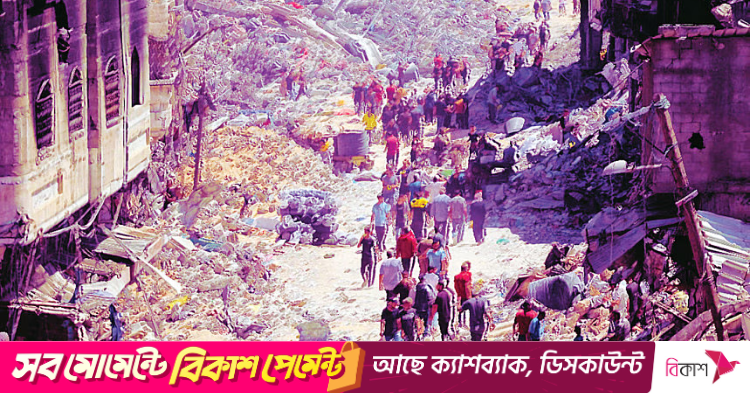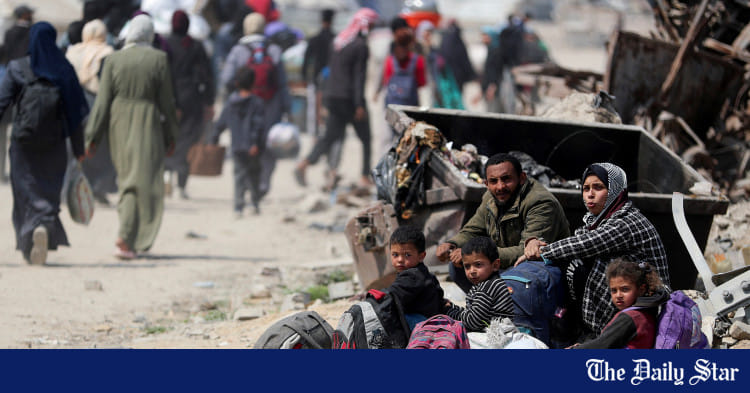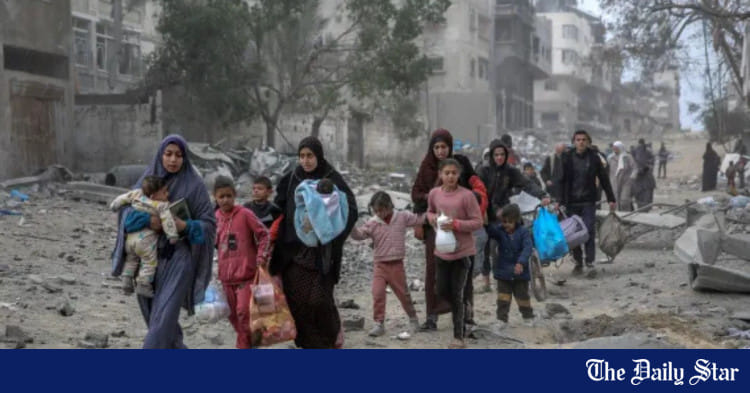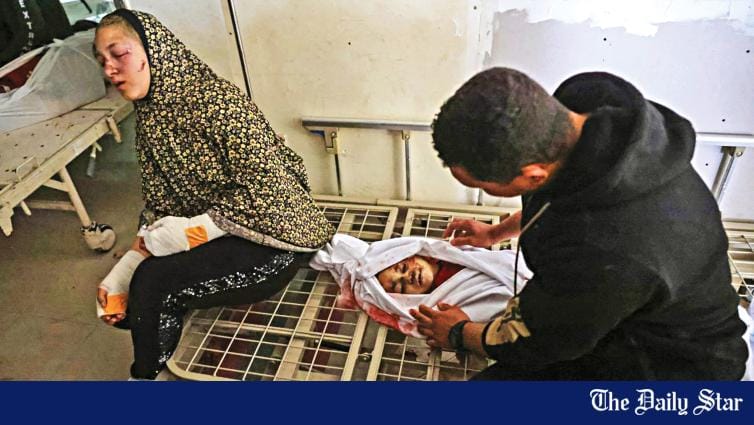Saif
Senior Member
- Joined
- Jan 24, 2024
- Messages
- 17,300
- Likes
- 8,334
- Nation

- Residence

- Axis Group


Israeli airstrike kills nine people in north Gaza town, medics say, amid ceasefire disputes
At least nine Palestinians were killed, including three local journalists, and others wounded on Saturday in an Israeli airstrike on Gaza's northern Beit Lahiya town, Gaza's health ministry said, as Hamas' leaders hold Gaza ceasefire talks with mediators in Cairo. Several were critically injured a
Israeli airstrike kills nine people in north Gaza town, medics say, amid ceasefire disputes
REUTERS
Published :
Mar 15, 2025 21:56
Updated :
Mar 15, 2025 21:56

Northern Gaza Strip March 15, 2025. Photo : REUTERS/Mahmoud Issa
At least nine Palestinians were killed, including three local journalists, and others wounded on Saturday in an Israeli airstrike on Gaza's northern Beit Lahiya town, Gaza's health ministry said, as Hamas' leaders hold Gaza ceasefire talks with mediators in Cairo.
Several were critically injured as the strike hit a car, with casualties inside and outside the vehicle, health officials told Reuters.
The Reuters Daily Briefing newsletter provides all the news you need to start your day. Sign up here.
Witnesses and fellow journalists said the people in the car were on a mission for a charity called Al-Khair Foundation in Beit Lahiya, and they were accompanied by journalists and photographers when the strike hit them. At least three local journalists were among the dead, according to Palestinian media.
The Israeli military said in a statement that it had struck two individuals that it identified as "terrorists" operating a drone that it said posed a threat to forces in Beit Lahiya.
The military later struck several other suspects who it said had collected the drone equipment and entered a vehicle.
The military did not say how it had determined that the individuals it had struck were "terrorists" or provide detail on the threat that the drone had posed to its soldiers.
The incident underscores the fragility of the January 19 ceasefire agreement that halted large-scale fighting in the Gaza Strip. Palestinian health officials say dozens of people have been killed by Israeli fire despite the truce.
Salama Marouf, the head of the Hamas-run Gaza government media office, denied the army's allegations.
"The team was made of civilians and worked in an area near a shelter on a mission sponsored by a charity. They didn't exist in a prohibited area and didn't pose any danger of any kind to the occupation army," Marouf said in a statement.
The Palestinian militant group accused Israel in a statement of attempting to renege on the ceasefire agreement, putting the number of Palestinians killed since January 19 at 150.
It urged mediators to compel Israel to move ahead with the implementation of the phased ceasefire deal, blaming Israel's Prime Minister Benjamin Netanyahu for the current impasse.
Responding to some of the incidents reported by Gaza medics, the Israeli military says its forces have intervened to thwart threats by "terrorists" approaching its forces or planting bombs on the ground near where forces operate.
Since a temporary first phase of the ceasefire expired on March 2, Israel has rejected opening the second phase of talks, which would require it to negotiate over a permanent end to the war, the main demand of Hamas.
The incident coincided with a visit by Hamas' exiled Gaza chief, Khalil Al-Hayya, to Cairo for further ceasefire talks aimed at resolving disputes with Israel that could risk a resumption of fighting in the enclave.
On Friday, Hamas said it had agreed to free an American-Israeli dual national if Israel begins the next phase of ceasefire talks towards a permanent end to the war, an offer Israel dismissed as "psychological warfare."
Hamas said it had made the offer to release New Jersey native Edan Alexander, a 21-year-old soldier in the Israeli army, after receiving a proposal from mediators for negotiations on the second phase of a ceasefire deal.
Israel says it wants to extend the ceasefire's temporary first phase, a proposal backed by U.S. envoy Steve Witkoff. Hamas says it will resume freeing hostages only under the second phase.
The war began when Hamas carried out a cross-border raid into southern Israel on October 7, 2023, killing 1,200 people and capturing 251 hostages, according to Israeli tallies.
Israel's subsequent assault on Gaza has killed more than 48,000 Palestinians, according to Gaza health officials, and reduced much of the territory to rubble and led to accusations of genocide and war crimes that Israel denies.
REUTERS
Published :
Mar 15, 2025 21:56
Updated :
Mar 15, 2025 21:56
Northern Gaza Strip March 15, 2025. Photo : REUTERS/Mahmoud Issa
At least nine Palestinians were killed, including three local journalists, and others wounded on Saturday in an Israeli airstrike on Gaza's northern Beit Lahiya town, Gaza's health ministry said, as Hamas' leaders hold Gaza ceasefire talks with mediators in Cairo.
Several were critically injured as the strike hit a car, with casualties inside and outside the vehicle, health officials told Reuters.
The Reuters Daily Briefing newsletter provides all the news you need to start your day. Sign up here.
Witnesses and fellow journalists said the people in the car were on a mission for a charity called Al-Khair Foundation in Beit Lahiya, and they were accompanied by journalists and photographers when the strike hit them. At least three local journalists were among the dead, according to Palestinian media.
The Israeli military said in a statement that it had struck two individuals that it identified as "terrorists" operating a drone that it said posed a threat to forces in Beit Lahiya.
The military later struck several other suspects who it said had collected the drone equipment and entered a vehicle.
The military did not say how it had determined that the individuals it had struck were "terrorists" or provide detail on the threat that the drone had posed to its soldiers.
The incident underscores the fragility of the January 19 ceasefire agreement that halted large-scale fighting in the Gaza Strip. Palestinian health officials say dozens of people have been killed by Israeli fire despite the truce.
Salama Marouf, the head of the Hamas-run Gaza government media office, denied the army's allegations.
"The team was made of civilians and worked in an area near a shelter on a mission sponsored by a charity. They didn't exist in a prohibited area and didn't pose any danger of any kind to the occupation army," Marouf said in a statement.
The Palestinian militant group accused Israel in a statement of attempting to renege on the ceasefire agreement, putting the number of Palestinians killed since January 19 at 150.
It urged mediators to compel Israel to move ahead with the implementation of the phased ceasefire deal, blaming Israel's Prime Minister Benjamin Netanyahu for the current impasse.
Responding to some of the incidents reported by Gaza medics, the Israeli military says its forces have intervened to thwart threats by "terrorists" approaching its forces or planting bombs on the ground near where forces operate.
Since a temporary first phase of the ceasefire expired on March 2, Israel has rejected opening the second phase of talks, which would require it to negotiate over a permanent end to the war, the main demand of Hamas.
The incident coincided with a visit by Hamas' exiled Gaza chief, Khalil Al-Hayya, to Cairo for further ceasefire talks aimed at resolving disputes with Israel that could risk a resumption of fighting in the enclave.
On Friday, Hamas said it had agreed to free an American-Israeli dual national if Israel begins the next phase of ceasefire talks towards a permanent end to the war, an offer Israel dismissed as "psychological warfare."
Hamas said it had made the offer to release New Jersey native Edan Alexander, a 21-year-old soldier in the Israeli army, after receiving a proposal from mediators for negotiations on the second phase of a ceasefire deal.
Israel says it wants to extend the ceasefire's temporary first phase, a proposal backed by U.S. envoy Steve Witkoff. Hamas says it will resume freeing hostages only under the second phase.
The war began when Hamas carried out a cross-border raid into southern Israel on October 7, 2023, killing 1,200 people and capturing 251 hostages, according to Israeli tallies.
Israel's subsequent assault on Gaza has killed more than 48,000 Palestinians, according to Gaza health officials, and reduced much of the territory to rubble and led to accusations of genocide and war crimes that Israel denies.









































